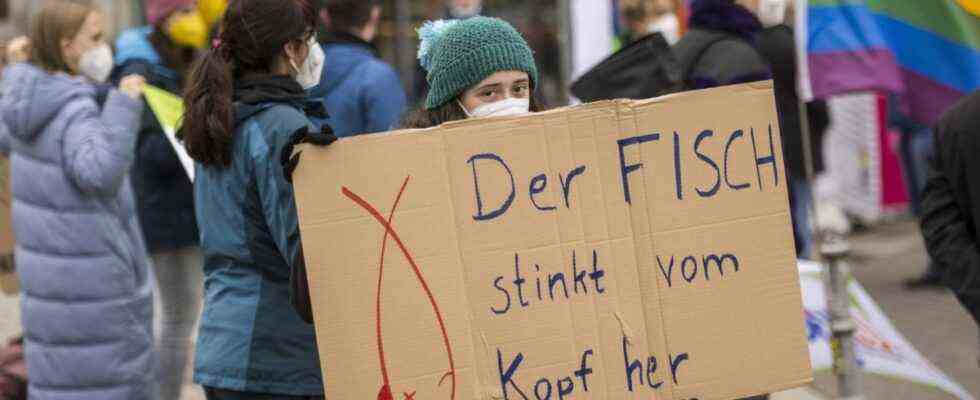The Archdiocese of Hamburg is 32,520 square kilometers in size, stretching from Sylt via Lübeck to Neubrandenburg in the Mecklenburg Lake District. In this diocese, which is the largest in Germany in terms of area, there is not a single candidate for the priesthood, says Archbishop Stefan Hess: “I don’t know how I’m going to fill all the parishes in the future.” Hesse therefore voted – like 86 percent of the members of the Synodal Path – on Friday in Frankfurt for a relaxation of celibacy.
The corresponding paper calls on the leaders of the Catholic Church in Germany to lobby the Pope for the admission of so-called viri probati – i.e. for the admission of “proven”, but just married men to the priesthood. In addition, already ordained priests should be allowed to marry and remain in office. At the same time, the text continues to positively appreciate celibacy as a way of life.
Munich Archbishop Cardinal Reinhard Marx had only on Thursday in an interview with the Süddeutsche Zeitung advocated the abolition of compulsory celibacy. The bishops’ conference chairman Georg Bätzing had supported this demand. The text now available was approved in the first reading on Friday, and a binding vote is to follow at the fourth synodal assembly in autumn. But even then it is more than questionable whether Pope Francis will actually implement such a demand. Most recently, at the Amazon Synod in 2019, several bishops called for the use of viri probati, which Francis rejected.
At times the atmosphere at the third synodal assembly was chilly – but this was less due to scandals and controversies (see box) and more to the heating system on strike in the exhibition center. The members of the synod passionately discussed power and the separation of powers, the priestly existence, homosexuality and women in sacramental ministries, again at a high theological level. On Thursday evening, the synodal path passed an important basic text on dealing with power and the separation of powers – which, however, has not yet resulted in concrete actions.
Sharp criticism of the bishops from the advisory board
The discussions were shaped above all by the Munich abuse report presented a good two weeks ago and the statements contained therein by Pope Emeritus Benedict XVI. The Benedictine Sister Philippa Rath made it clear on Thursday how much self-committed Catholics quarrel with the church. She tells of religious who call her and ask if they can leave the church and remain a member of the order at the same time. “Almost two years ago I said, ‘I suffer from my church, but I love it,'” says Sister Philippa. “I must confess to you that today I no longer know exactly whether I can still love my church.”
Sharp criticism of the bishops was expressed on Friday by representatives of the advisory board. Among other things, the fact that the bishops continue to adhere to the controversial procedure for recognition services. From the point of view of those affected, it is not transparent enough and the benefits paid are too low.
The Bishop of Regensburg, Rudolf Voderholzer, caused an uproar during the Synodal Path on Thursday: In the discussion about the Munich report on abuse, Voderholzer had mentioned that a criminal law reform of 1973 no longer considered abuse a crime, “on the basis of sexological judgments that assume that the interrogations are much worse for the children and young people concerned than the basically harmless cases of abuse”. This must be taken into account when discussing the Church in the 1970s and 1980s today. However, because Voderholzer had not made it sufficiently clear that he was quoting the statements of others and, especially since the chairperson interrupted his presentation and reminded him to adhere to the speaking time, many members of the synod got the impression that Voderholzer was adopting the sentences and playing down abuse . During the debate that followed, Bishops’ Conference Chairman Georg Bätzing rushed to the representatives of those affected in the hall and spoke to them. As it turned out later, the Presidium of the Synodal Path even considered public disapproval – until Voderholzer made it clear that he had only quoted and criticized this attitude. On Friday, Vorderholzer then sought to talk to those affected himself and apologized, also in a public statement: “I shouldn’t have expressed my criticism in this short form,” writes Voderholzer. “I’m extremely sorry, especially because of the victims who now feel kicked in the stomach.” He stands by the victims.
Annette Zoch
Contrary to the express request, the Advisory Council was not invited to the Permanent Council in November, said representative Johannes Norpoth: “Dear Bishops, for weeks and months you have been preaching about shared responsibility for overcoming this crisis, about openness and transparency. But you decide differently. At best, they give us a seat at the side table in one of the central topics of dealing with sexualized violence.”
Norpoth also sharply criticized the decision of the bishops’ conference to officially recognize the controversial Catholic Scouts of Europe (KPE). “As part of the activities of this organization, acts of sexualized violence and spiritual abuse are known, one victim is a member of the advisory board. Were we consulted on this question before the decision was made? None!”

